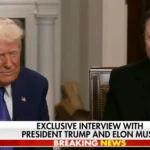A month into Donald Trump’s second term, four former U.S. presidents—Bill Clinton, George W. Bush, Barack Obama, and Joe Biden—have remained notably quiet.
Their silence has frustrated many Democrats who believe their voices are essential in a time of political upheaval.
Former presidents hold a unique place in American politics. They have seen the weight of the office up close and understand its power and responsibilities.
Their words shape public opinion, influence lawmakers, and serve as a moral compass during moments of crisis.
Yet, as Trump pushes the boundaries of executive authority, Clinton, Bush, Obama, and Biden have stayed on the sidelines. This reluctance to speak out has left many questioning their motivations.
Many Democrats see this silence as a missed opportunity. Democratic strategist Joel Payne believes their perspectives are “critical to the public discourse at this moment.”
A former senior Obama aide echoed this frustration, stating, “The time to speak isn’t after Trump dismantles the system. The time is now.”
Even Biden, who fought hard to keep Trump from returning to power, has remained quiet in his post-presidency.
In his farewell address, he warned of an “oligarchy taking shape in America.” Yet, since leaving office, he has refrained from directly challenging Trump’s actions.
Since returning to the White House, Trump has wasted no time enacting sweeping changes that have alarmed his critics. His administration has:
- Slashed federal jobs, with tech billionaire Elon Musk advising on government efficiency.
- Shut down the U.S. Agency for International Development (USAID), ending key global humanitarian programs.
- Issued executive orders that expand presidential power, raising constitutional concerns.
- Declared himself a “king” in a recent remark, intensifying fears of authoritarianism.
Each move has fueled opposition, yet the nation’s former presidents remain silent.
From Outspoken Critics to Quiet Observers
Before Trump’s reelection, Clinton, Obama, and Biden frequently warned against his leadership. Obama, speaking just last December, condemned the rise of politicians who undermine democracy for power.
Clinton repeatedly sounded alarms about creeping authoritarianism.
Yet, now that Trump is actually enacting policies they once feared, their voices are absent.
As the only Republican among the ex-presidents, George W. Bush’s voice could carry significant weight.
However, he has largely avoided commenting on sitting presidents, maintaining a long-standing tradition of former leaders staying out of the fray.
Some believe Bush sees little to gain from criticizing Trump. Others argue that his silence is a quiet acknowledgment of the growing influence of Trump’s movement within the Republican Party.
Not everyone believes the ex-presidents’ words would make a difference. Republican strategist Susan Del Percio argues that their voices “would be for history books, not for real impact.”
She believes Trump “doesn’t care what anyone thinks,” making criticism ineffective.
But history tells a different story. Former presidents have influenced public sentiment before—Obama’s strong condemnation of Trump during the 2020 election helped rally voters.
Clinton’s critiques of George W. Bush’s policies in the early 2000s shaped Democratic opposition.
The silence of ex-presidents reflects a larger dilemma in American politics. Should they break tradition and directly challenge Trump?
Or does their silence suggest they believe their influence has waned in today’s hyper-polarized climate?







